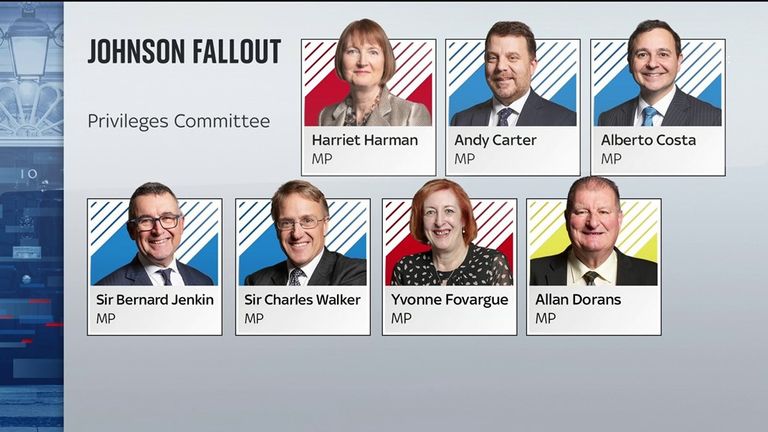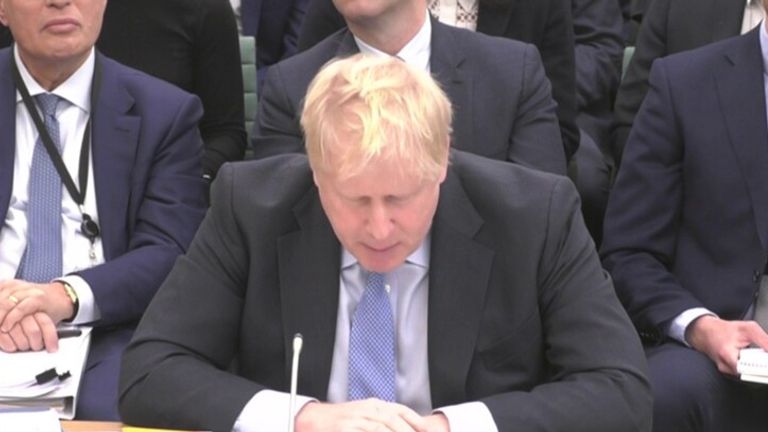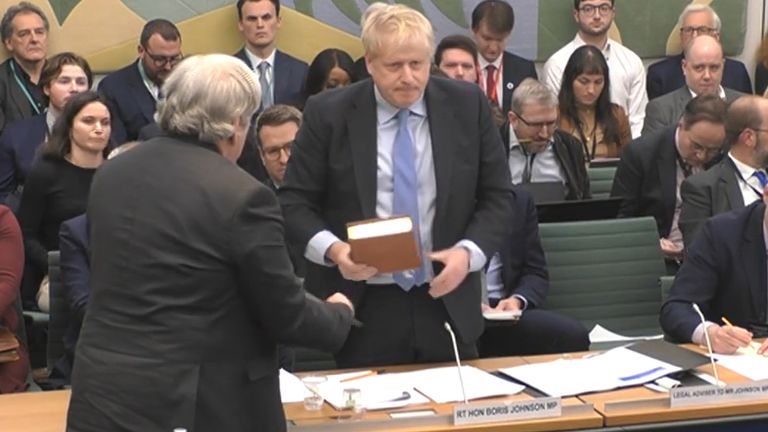
Boris Johnson focused much of his wrath on the House of Commons privileges committee when resigning as an MP.
In his letter, Mr Johnson said the committee’s “purpose from the beginning has been to find me guilty, regardless of the fact”.
He added that this was “the very definition of a kangaroo court”.
In response, the committee said it had “followed the procedures and the mandate of the House at all times and will continue to do so.
“Mr Johnson has departed from the processes of the House and has impugned the integrity of the House by his statement.
“The committee will meet on Monday to conclude the inquiry and to publish its report promptly. “
What is the privileges committee?
The House of Commons privileges committee is a cross-party group of MPs which is there to “consider specific matters relating to privileges referred by the House”.
Privilege, in this instance, is the ability of MPs to speak freely in the House of Commons without the threat of legal prosecution – and the ability to self-regulate.
In this case, the committee is regulating whether Boris Johnson deliberately misled them – something which would equate to contempt of parliament.
It was once merged with the committee on standards – but they have since been split, with the standards body now including members who are not MPs.
The standards brief is more broad, and relates to matters of conduct.
Who is on the privileges committee?
It is made up of seven MPs – four Conservatives, two from Labour and one from the SNP.
The MPs are voted onto the committee by their colleagues and reflect the political make-up of the House.
Labour’s Sir Chris Bryant is normally the chair, but recused himself from this investigation as he had already made a number of public comments about partygate.
Instead, senior Labour backbencher and mother of the House Harriet Harman took his place.
The other members are Tories Andy Carter, Alberto Costa, Sir Bernard Jenkin and Sir Charles Walker, as well as Labour’s Yvonne Fovargue and the SNP’s Allan Dorans.
What are their powers?
Technically, the only powers the committee has is to issue a report for the Commons for MPs to consider.
In its findings, it can conclude that an individual has been found to have “committed a contempt” in misleading the House, and it can recommend sanctions – ranging from an oral or written apology through to suspension for a specified period or even expulsion from the Commons.
But it falls to MPs to decide whether to accept the findings of the report and to follow through with any sanction.
If MPs agree to a suspension of 10 sitting days or 14 calendar days upwards, it would have triggered a recall petition for Mr Johnson, allowing his constituents in Uxbridge and South Ruislip to vote on whether to hold a by-election for his seat.
This is now academic, after Mr Johnson announced he is standing down, but the House will still vote on the report.
What did Boris Johnson tell them?
Boris Johnson took part in a blockbuster evidence session before the privileges committee earlier this year.
He started, unconventionally, by swearing an oath on a bible to “tell the truth, the whole truth, and nothing but the truth, so help me God”.
This meant the testimony was subject to the Perjury Act 1911 – so lying or providing a false account would be a criminal offence.
Not long afterwards, Mr Johnson told the committee that “hand on heart, I did not lie to the House.”
He said it was “absolutely essential for work purposes” to have a leaving “do” for some members of Number 10 staff who left during the pandemic.
At one point, he appeared to lose his temper while defending what happened in Number 10 during COVID.
Asked if he would have advised anyone else in the country at the time to hold a large-scale social gathering in the garden, he insisted it “was not a large social gathering, it was a gathering”.
“I really must insist this point, people who say that we were partying in lockdown simply do not know what they are talking about,” he said.
Click to subscribe to the Sky News Daily wherever you get your podcasts
One of his main defences was that he received assurances from senior members of staff that the events were not breaking the rules.
The former MP also attacked the committee – saying their actions were “manifestly unfair”.














